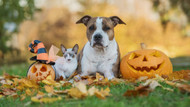Helping Your Pets Cope with Spooky Season
Posted by By My Happy Pets on Aug 15th 2022
The holiday season means guests, decorations, parties – and a whole lot of treats your dog probably shouldn’t get into. That’s especially true during Halloween, when heaps of candy come into your home and stick around for weeks afterward. Here are some common problems pets run into this time of year, and ways you can spot them.
The number one danger for dogs during Halloween is chocolate. Dogs have difficulty processing theobromine in chocolate, which means toxic buildups can happen more rapidly. Darker chocolates (cocoa, cooking chocolate, and dark chocolate) contain the highest levels of theobromine, while white chocolate and milk chocolate contain the lowest. If you notice your dog vomiting, trembling and experiencing loose stools and you think they may have eaten chocolate, call your vet and take them in – don’t wait.
Garbage gut, or “dietary indiscretion,” is when dogs ingest something their body can’t tolerate – typically either from being fed table scraps or getting into the garbage. During the Fall, you can add “decorations that look like food” to the list. Most cases of dietary indiscretion are minor and resolve themselves in 1-3 days. If you notice your dog experiencing loose stools, vomiting, loss of appetite, or lethargy for longer than a day, consult with your veterinarian.
Finally, nervousness is common for dogs during the holidays – kicking off with Halloween’s cavalcade of trick-or-treaters. If your dog appears anxious, confused or scared, keep them away from the front door so they don’t see the procession of costumed kids walking up. Soothing music will also help, and if you have a storm vest or jacket for your dog, let them wear that, too. Beyond barking at trick or treaters, this can be a very common time for pets to escape. Ensure they are microchipped and try not to leave them outside unattended.
And if your dog is experiencing loose stools, keep an eye on the Four C’s of pet stool: color, consistency, contents and coating. If you notice your pet’s stool is loose and liquid, discolored, contains worm segments or has a film-like coating, contact your veterinarian.
Thankfully, a lot of intestinal distress is fleeting, and typically works itself out within a day. If problems persist, talk with your vet about Pro-Pectalin™. Pro-Pectalin™ can soothe your pet’s upset stomach stemming from a variety of causes, and comes in a gel or tablet form, so even finicky pets can be treated.
FURTHER READING:
https://www.petmd.com/dog/care/how-should-my-dogs-poop-look
https://www.justrightpetfood.com/blog/whats-your-dogs-poop-telling-you
https://www.purina.com/pro-plan/articles/health/what-should-dog-poop-look

